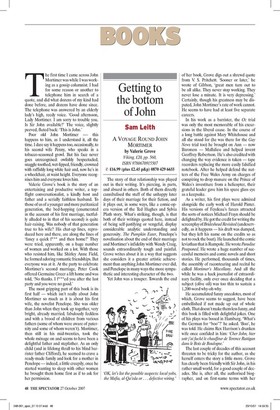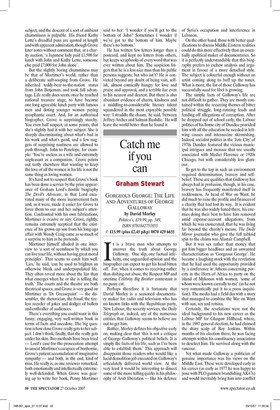Getting to the bottom of John
Sam Leith A VOYAGE ROUND JOHN MORTIMER by Valerie Grove Viking, £20, pp. 560, ISBN 9780670915507 £16.99 (plus £2.45 p&p) 0870 429 6655 The first time I came across John Mortimer was while I was work ing as a gossip columnist. I had for some reason or another to telephone him in search of a quote, and did what dozens of my kind had done before, and dozens have done since. The telephone was answered by an elderly lady's high, reedy voice. 'Good afternoon, Lady Mortimer. I am sorry to trouble you. Is Sir John available?' The voice, slightly peeved, fluted back: 'This is John.'
Poor old John Mortimer -- this happens to him, as I understand it, all the time. I dare say it happens too, occasionally, to his second wife Penny, who speaks in a tobacco-seasoned growl. But his face never goes unrecognised: owlishly bespectacled, snaggle-toothed, wet-lipped, friendly, crowned with raffishly long white hair and, now he's in a wheelchair, at waist height. Everyone recognises him and everyone loves him Valerie Grove's book is the story of an entertaining and productive writer, a topflight conversationalist, a kindly host and father and a serially faithless husband. To those of us of a younger and more puritanical generation, the bed-hopping (enumerated in the account of his first marriage, tactfully alluded to in that of his second) is quite hair-raising. Was nobody of that generation true to his wife? His chat-up lines, reproduced here and there, are along the lines of 'fancy a quick f*** and then home?' They were tried, apparently, on a huge number of women and worked on a lot. With those who resisted him, like Shirley Anne Field, he formed adoring romantic friendships. But everyone was at it. At the party to celebrate Mortimer's second marriage, Peter Cook offered Germaine Greer a lift home and was told, 'No thanks. I f***ed you after the last party and you were no good.'
The most gripping part of this book is its first half — which isn't really about John Mortimer so much as it is about his first wife, the novelist Penelope. She was older than John when they took up together, very bright, already married, fabulously feckless and with a brood of children from various fathers (some of whom were aware of paternity and some of whom weren't). Mortimer, then still in his mid-twenties, took the whole ménage on and seems to have been a delightful father and stepfather. As an only child (and in lifelong thrall to his blind barrister father Clifford), he seemed to crave a ready-made family and look for a mother in Penelope — indeed, a little creepily, once he started wanting to sleep with other women he brought them home first as if to ask for her permission.
The story of that relationship was played out in their writing. It's piercing, in parts, and absurd in others. Both of them directly cannibalised the stuff of the unhappy later days of their marriage for their fiction, and it plays out, in some ways, like a comic-opera version of the Ted Hughes and Sylvia Plath story. What's striking, though, is that both of their writings quoted here, instead of being self-justifying or vengeful, display considerable analytic understanding and generosity. The Pumpkin Eater, Penelope's novelisation about the end of their marriage and Mortimer's infidelity with Wendy Craig, sounds extraordinarily tough and painful. Grove writes about it in a way that suggests she considers it a greater artistic achievement than anything John Mortimer ever did, and Penelope in many ways the more sympathetic and interesting character of the two.
Yet John was a trouper. Towards the end of her book, Grove digs out a shrewd quote from V. S. Pritchett. 'Sooner or later,' he wrote of Gibbon, 'great men turn out to be all alike. They never stop working. They never lose a minute. It is very depressing.' Certainly, though his greatness may be disputed, John Mortimer's rate of work cannot. He seems to have had at least five separate careers.
In his work as a barrister, the Oz trial was only the most memorable of his excursions in the liberal cause. In the course of a long battle against Mary Whitehouse and all she stood for (he was there for the Gay News trial too) he brought on Ann — now Baroness — Mallalieu and helped invent Geoffrey Robertson. He's also credited with changing the way evidence is taken — tape recorders replacing the more easily falsified notebook. After he helped defend the nutters of the Free Wales Army on charges of conspiring to drop manure on the Prince of Wales's investiture from a helicopter, their grateful leader gave him his spare glass eye as a keepsake.
As a writer, his first plays were admired alongside the early work of Harold Pinter. His versions of Feydeau's farces attracted the sorts of notices Michael Frayn should be delighted by. He got the credit for writing the screenplay ofBrideshead Revisited (undeservedly, as it happens — his draft was dumped, but they left his name on the credits so as not to rock the boat). He launched the comic leviathan that is Rumpole. He wrote Paradise Postponed. He wrote a huge number of successful memoirs and comic novels and short stories. He performed, thousands of times, the assembly of raconteuring and recital he called Mortimer's Miscellany. And all the while he was a hack journalist of extraordinary facility, only ever once deciding that a subject (olive oil) was too thin to sustain a 1,200-word why-oh-why.
He accumulated funny anecdotes, most of which, Grove seems to suggest, have been embellished if not made up out of whole cloth. That doesn't make them less funny, and this book is filled with delightful jokes. One of his plays was booed in Hamburg. 'What's the German for "boo"?' he asked. 'Boo', he was told. He claims Rex Harrison's drunken wife once confided in him. 'Cher John, hier soir fucke le chauffeur de Terence Rattigan dans le Bois de Boulogne.'
The last couple of decades of this account threaten to be tricky for the author, as she herself enters the story a little more. Grove has clearly been friendly with Sir John, in his rather small world, for a good couple of decades. She is, after all, the authorised biographer, and on first-name terms with her subject, and the descent of a sort of ambient chumminess is palpable. His friend Kathy Lette's dreadful puns are quoted at length and with apparent admiration, though Grove later notes without comment that, at a charity auction, 'a Japanese lady paid £1,500 for lunch with John and Kathy Lette; someone else paid £7,000 for John alone'.
But the slightly boring chumminess may be that of Mortimer's world, rather than a deliberate soft-soaping from Grove. He inherited teddy-bear-to-the-nation status from John Betjeman, and took full advantage. Life really does seem, once he reached national treasure stage, to have become one long agreeable lunch party with famous men and doting younger women paying sycophantic court. And, for an authorised biographer, Grove is surprisingly starchy. You even half suspect, at some points, that she's slightly had it with her subject. She is sharply discriminating about what's bad in his work and what's good, and a few nuggets of surprising nastiness are allowed to push through. John to Penelope, for example: 'You're useless as a wife and extremely unpleasant as a companion.' Grove points out tartly elsewhere that wanting to keep the love of all the women in his life is not the same thing as loving women.
It's hard not to suspect that Grove's book has been done a service by the prior appearance of Graham Lord's hostile biography The Devil's Advocate, in that Lord excavated many of the more inconvenient facts and, as it were, made it easier for Grove to force them to our and her subject's attention. Confronted with his own fabrications, Mortimer is evasive or airy. Grove, rightly, remains extremely sceptical that the existence of his grown-up son from his long-ago affair with Wendy Craig came as so much of a surprise to him as he pretends.
Mortimer himself alluded in one interview to 'a sort of seemliness by which you can live your life, without having great moral principles'. That seems to catch him well. 'Lies,' he said, 'can be used to brighten an otherwise bleak and underpopulated life. They often reveal more about the liar than what emerges when he or she is telling the truth.' The courts and the theatre are both theatrical spaces, and Grove is very good on Mortimer as 'Dr Greasepaint' — the dissembler, the rhetorician, the fraud, the tireless recycler of jokes and dodger of bullets and enthraller of audiences.
There's everything you could want in this funny, engaging, very well-written book in terms of facts and anecdote. The big question is how close Grove really gets to her subject. I don't think, finally, that she really gets under his skin. Two methods have been tried — Lord's case-for-the-prosecution attempt to unseat Mortimer's carapace of bonhomie, Grove's patient accumulation of imaginative sympathy — and both, in the end, kind of miss. He really is, as one reviewer remarked, both emotionally and intellectually extremely well-defended. When Grove was gearing up to write her book, Penny Mortimer said to her: 'I wonder if you'll get to the bottom of John? Sometimes I wonder if we've got to the bottom of him Maybe there's no bottom.'
He has written few letters longer than a postcard, and kept no letters from others, but keeps scrapbooks of every word that was ever written about him The suspicion lingers that he is a less nice man than his public persona suggests; but who isn't? He is convicted beyond any doubt of being vain, selfish, almost comically hungry for love and praise and approval, and a terrible liar even to his nearest and dearest. But there is also abundant evidence of charm, kindness and a middling-to-considerable literary talent squandered in the most enjoyable possible way: 'I straddle the chasm,' he said, 'between Jeffrey Archer and Salman Rushdie.' He will leave the world better than he found it.



































































 Previous page
Previous page